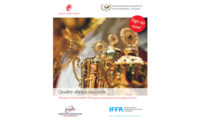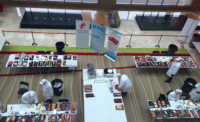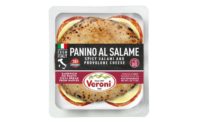Why IFFA brought its meat competition to the United States, Japan, Russia
In this video, Jeff Sindelar, Department of Animal Science at the University of Wisconsin-Madison and host of the event, discusses why the competition now has several satellite competitions, how this competition differs from American quality meat competitions and what are the benefits of entering these competitions.
Sam Gazdziak: We’re here with Dr. Jeff Sindelar from the University of Wisconsin’s Meat Lab. He’s the host for this year’s IFFA America Competition. Can you talk a little bit about what’s going on here, and why and how this came to America for the first time?
Jeff Sindelar: We are currently on Day One of a three-day event, called the Quality Competition for Ham and Sausage, and we are holding the first ever international processed meats competition in the United States.
Gazdziak: This has been going on annually at IFFA in Germany, but it’s been kind of difficult for Americans to get their products entered. What have been some of those problems?
Sindelar: The reason this event is occurring here in the U.S. and here in Madison is that over the past several cycles of IFFA and the German Butcher’s Association who are the governing body for small craft butchers in Germany. During IFFA, which is every four years, they hold an international ham and sausage competition or a quality ham and sausage competition. U.S. processors as well as processors from other countries outside of the EU have historically entered products in that competition, but the last few cycles there have been some difficulty regarding customs and getting the products over into the EU. Because the German Butcher’s Association realized this as a problem and a challenge and also realized they want to maintain this as an international competition, they have set up some satellite competitions or contests around the world. They have already held a contest similar to this in Japan, and they’ve also held one in Russia. This is the third contest before the official contest which is occurring in May at this upcoming IFFA.
Gazdziak: For the people who have been in the American Cured Meats Competition, they kind of understand that process and you are trying to be the best in your category. This is a little bit different. How is this different than the Cured Meats Championship?
Sindelar: Correct, this is a very different competition. First, it’s important to realize that the judges are from Germany. They are actually the same judges from the German Butcher’s Association. They are the same judges that will be judging the quality competition at the IFFA in May, and the categories as such are the same as the IFFA. So there are two classes: a ham class and a sausage class. Essentially, any product as long as it’s cooked and at a minimum weight for entering in competition can be entered in that class, so it’s sort of like judging a best of show. We have a whole array of different products all being judged, however they are not being judged against each other. They are being judged against themselves. So a summer sausage for example being evaluated would be evaluated against what is considered a gold standard for that product. So if we look at the products that are on the table, and today, there are about 120 products that are being judged, there’s probably 40 to 50 different types of products on those tables, so the judges have to go through product by product, exhibit by exhibit and evaluate those products based on the standards and the quality of that type of product in that product category.
Gazdziak: What are the benefits do you think for the processors who submit products to cured meat competitions or quality competitions like this?
Sindelar: The benefits are tremendous. First and foremost, if you are fortunate enough to have a high score for your products—and the scoring system is a point system similar to how we do competitions in the U.S.—if there are enough points assigned to that product for positive attributes, that product can receive either a bronze, silver or gold medallion, which is placed on a plaque. So meat processors who receive one of those awards can hang those on their wall and use those for publicizing and showing their consumers that they make truly world class products. For other processors, it’s really a personal challenge. They want to challenge themselves to make the best product they possibly can, and if they are successful at a local, state or even national product competition, the ability to be successful at an international competition is just raising the bar a little bit higher.
Looking for a reprint of this article?
From high-res PDFs to custom plaques, order your copy today!







